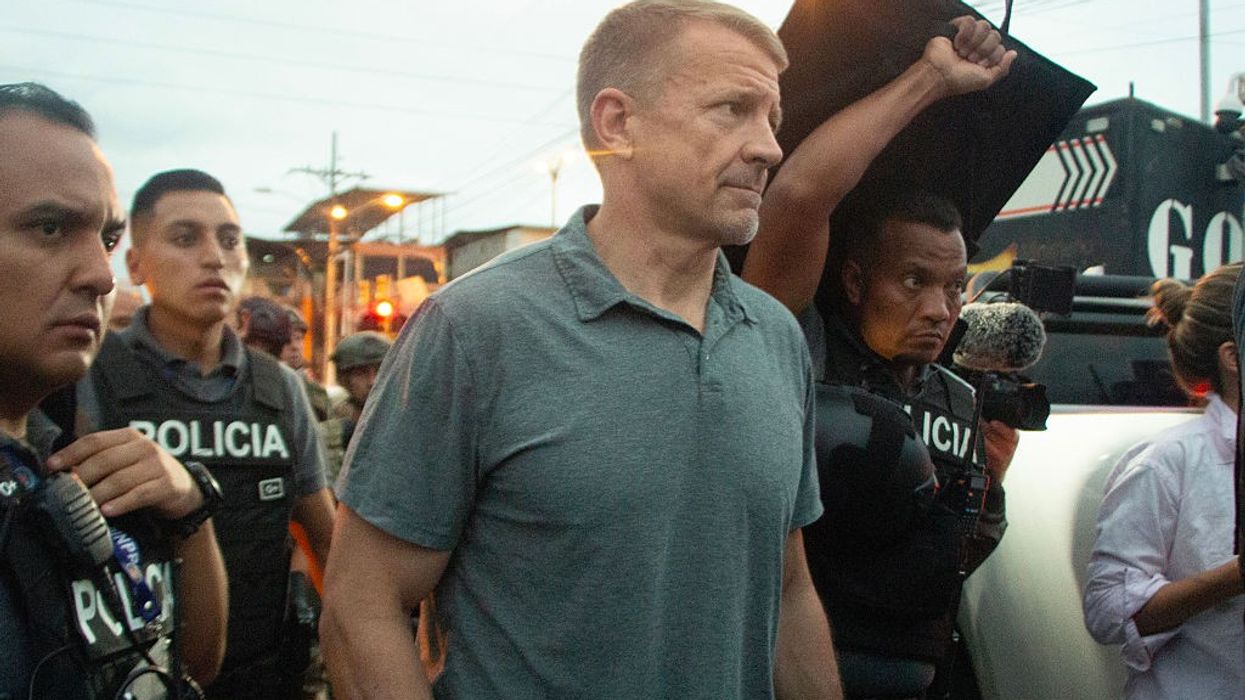During a November 2024 tour in the United States, attorneys Ingrid Escobar and Óscar Rosales of Socorro Jurídico Humanitario (SJH or Humanitarian Legal Aid ) were clear: They do not oppose the legal arrest and incarceration of gang members. But they’re resisting a suspension of constitutional rights that’s proven to be capricious in practice, cruel, dangerous, and deadly.
Institutionalizing Brutality
MS-13 killed 87 people during the last weekend of March 2022. At Bukele’s direction, the Legislative Assembly implemented Article 29, resulting in an extraordinary emergency measure called a “state of exception.” With it, “the rights to freedom of association and assembly, and privacy in communications, as well as some due process protections” were temporarily suspended. “Temporarily” has become long-term.
Of the 83,000 who have been detained during Bukele’s war against gangs, SJH estimates that only 40% are actually gang members, another 30% have collaborated with gangs (often unwillingly and sometimes under threat of death), and the remaining 30% (most of them also charged with collaboration) are actually innocent of any gang affiliation at all.
The denial of the presumption of innocence and a lack of access to legal representation and family are harrowing for detainees, as well as their loved ones.
So, easily 25,000 (and likely many more) innocent people have been arrested and held under inhumane conditions, including extreme overcrowding. Some released prisoners report 150 detainees sharing a single toilet, multiple people sharing a single bed, and those who can’t access a bed sleeping on floors with excrement.
In mid-November, Bukele stated that 8,000 state-of-exception prisoners had been released. But, according to Escobar, hundreds of release orders have been ignored. Former detainee Melvin Ortiz had received 24 such orders but was only released after his case was taken to the United Nations.
SJH claims there were at least 330 deaths in detention between April 27, 2022 and the end of October 2024. About half were due to violence, 40% to medical neglect, and 10% to terminal illness. Notably, 94% of those 330 decedents did not belong to gangs.
Considering the cumulative institutional brutality, these deaths aren’t surprising. Some released prisoners report “welcome beatings” by prison guards upon incarceration, extreme malnutrition, dehydration (prisoners receive four ounces of water to drink daily), torture, and a lack of medications or medical care.
There is psychological trauma, too. The denial of the presumption of innocence and a lack of access to legal representation and family are harrowing for detainees, as well as their loved ones.
Arbitrary and Political Arrests
One government official told Leslie Schuld, director of Centro de Intercambio y Solidaridad: “We are throwing out nets to capture gang members and then we will release the innocent people caught in the nets.” But statistics from the past 32 months show that, once imprisoned, it’s easier to become entangled in those metaphorical nets than be released.
In practice, anyone—but it’s usually people in low-income neighborhoods—can be arrested under the state of exception. SJH reports that police and military personnel arrest arbitrarily to fulfill quotas. Allegations against persons can be made anonymously—which has proven handy for unscrupulous people with grudges, unwelcome competitors, or even romantic rivals. People are arrested for their tattoos (one young man was detained for having a rose tattoo honoring his mother, Rosa), for haircuts or clothing deemed suspicious, for having an old criminal record, or for having been deported from the United States.
“The fear we have is that we’ll be the next ones he arrests despite never having broken the law.”
Sandra Leticia Hernández fits several of these categories. After serving a sentence in Ilopango prison, she returned to Isla El Espíritu Santo where she lived with her lesbian life partner. Business competitors resented her thriving motorcycle-taxi service as well as her sexual orientation. Sandra was arrested first—and then her partner, Eidi Roxana Claros de Zaldaña, was detained when she made inquiries about her. Sandra was released eventually, while Eidi remains incarcerated.
Young Salvadorans are deeply affected by state-of-exception injustices. Human Rights Watch has observed that many children in low-income barrios are doubly traumatized: once preyed upon by gangs, they are now targeted by the police and state security forces. Over 3,000 children have been arrested; detainees as young as 12 years old can receive prison sentences of up to 10 years.
Additionally, both SJH and Columbia University’s Center for Mexico and Central America claim that, in El Salvador, “an estimated 100,000 children and adolescents had been effectively orphaned” after their parents disappeared into detention. SJH reports that many of these children lack basic necessities and some of them experience one or more of the following: depression, weight loss, eating disorders, nightmares, hyperactivity, aggressiveness, and fear and anger toward the military and police.
Finally, troublesome critics of corporations and the government—such as union members denouncing corruption, social activists, and human-rights defenders—are targeted. That includes the SJH. At a press conference, Escobar talked about the scrutiny they’re under: “These [investigatory] actions include surveillance and monitoring of our homes, workplaces, and the facilities of the Humanitarian Legal Aid. We have confirmed [this] through license plates on vehicles that are used solely for police purposes.”
Thirsting for Justice
But SJH isn’t deterred. In addition to providing full legal accompaniment to 100 innocent clients, SJH is rendering habeas corpus services to another 2,600. And because many of its clients were sole breadwinners, SJH provides material support to their families. So far, SJH has secured the release of 50 innocents, after taking some of their cases to international courts.
Escobar declares on her X page: “Tengo sed, sed de #Justicia.” She is thirsty for justice—but it’s risky. Elsewhere she’s acknowledged, “The fear we have is that we’ll be the next ones he arrests despite never having broken the law.”
SJH has a loud collective voice that carries far. It regularly denounces the Bukele administration’s violations of human rights in national and international settings. Surely these defenders of El Salvador’s hard-won but vulnerable democratic rights deserve our moral, political, and monetary support.
Please call senators and representatives through the U.S. Capitol switchboard at (202) 224-3121. Ask that U.S. aid for the Salvadoran armed forces be withheld until all innocents have been released and the prisons investigated independently.




